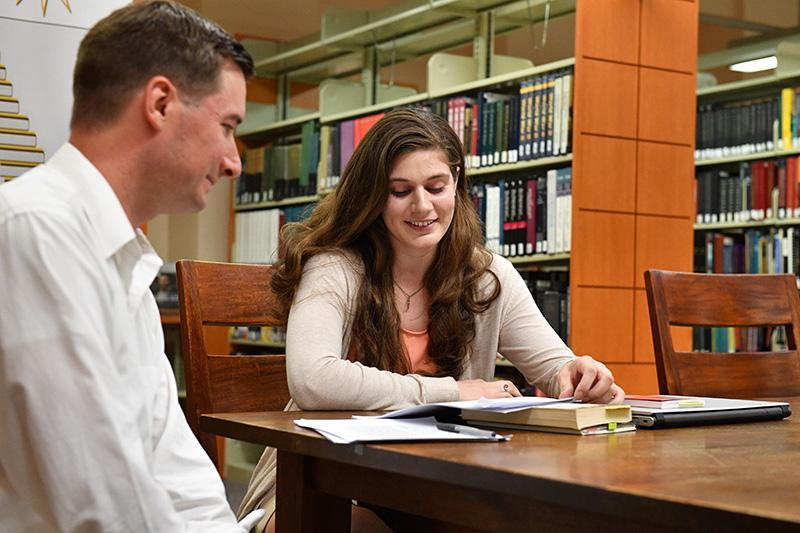What Wicked Stepmother?

Maj. Steve Knepper and Maddy Moger '20 discuss her research on fairy tales.—VMI Photo by Mary Price.
LEXINGTON, Va., July 24, 2019—Classic fairy tales such as “Snow White and the Seven Dwarfs” and “Hansel and Gretel” have long been a childhood staple, even before entertainment behemoths such as Walt Disney turned them into ongoing sources of revenue through movies, toys, games, and more.
But are the stories just stories, or do they convey a deeper truth meant to help children deal with a sometimes overwhelming and scary world? That’s the question Maddy Moger ’20 attempted to answer in her Summer Undergraduate Research Institute project, “The Grimm Truth: What the Fairy Tale’s Wicked Stepmother Reveals about Childhood Psychology.”
Moger, an English major who hopes to commission into the Coast Guard, found her topic while taking a class with Maj. Steven Knepper, assistant professor of English, rhetoric, and humanistic studies. In that class, she wrote an essay on “Hansel and Gretel,” a Brothers Grimm fairy tale in which a witch living deep in the forest attempts to cook and eat the brother and sister pair of Hansel and Gretel—but winds up roasting in her own oven due to the children’s cleverness. In the end, the children come home safely and the tale ends happily.
Moger wasn’t thinking about a summer research project as she began writing on the fairy tale, but the more she wrote, the more she realized she could write.
“It started out as a pretty simple essay, and I did some more research and got really excited about it,” she stated. “I could see a dream sequence within the narrative, and that got me thinking about psychology within fairy tales.”
This summer, she focused on the archetype of the wicked stepmother, as that’s a common thread found in several oral legends written down in the early 19th century by German brothers Wilhelm and Jacob Grimm. As she researched the history of these legends, Moger made a discovery that might be astonishing to many: all of the stepmother characters were originally biological mothers.
When the Grimms sent their volume to be printed, she explained, editors rebelled, saying that mothers were too culturally sacred to be portrayed in this way. The wicked stepmother was thus born to work around the editors’ objections.
“That makes it interesting about the family dynamic,” said Moger. “All of these abusive stepmothers—the Brothers Grimm originally wrote them down as biological mothers.”
But why would mothers or stepmothers be portrayed in this way? To answer this question, Moger is delving the writings of psychoanalysts Sigmund Freud and Carl Jung.
“Maddy is looking at some of these classic psychoanalytic approaches to fairy tales, like Bruno Bettelheim [a disciple of Freud’s] …. And she’s really interested in how the fairy tales themselves seem to invite some of this,” said Knepper, who advised Moger on her summer work. “She’s also recently moving into some of the recent psychological research on fairy tales and kids.”
As of early July, Moger was hoping to sit down with a faculty member in the psychology department to learn more about child development. But she already had a theory as to why these tales have such continuous appeal to generation after generation of youngsters.
“These fairy tales, their structure and the images in them, reflect the child’s unconscious mind,” said Moger. “The wicked stepmother can be seen as the splitting of a manifestation of a parent.”
Moger is also well aware that some well-intentioned people say that fairy tales only serve to feed children’s fears.
“Some parents and some critics don’t like fairy tales because they can be really scary,” Moger commented. “But a lot of the negative themes introduced in fairy tales, abandonment, fear of the dark—children already have these fears.”
She continued, “Giving them these fairy tales … you’re not giving them the fear. You’re giving them the tool to combat the fear. It’s the sword to defeat the dragon kind of thing.”
- Mary Price
-VMI-
.svg)
.png)